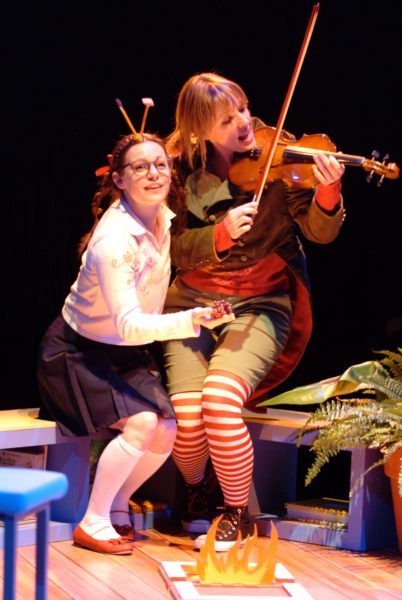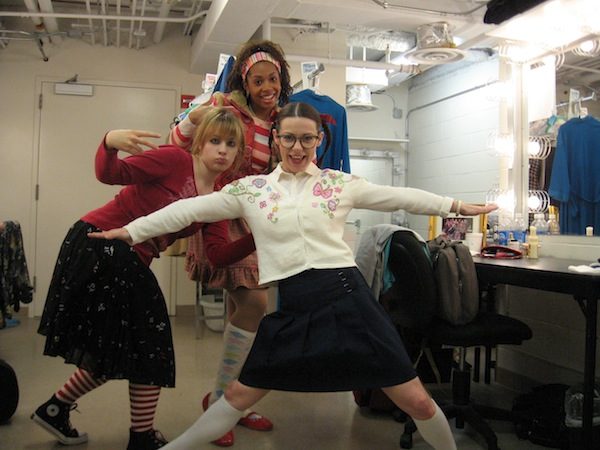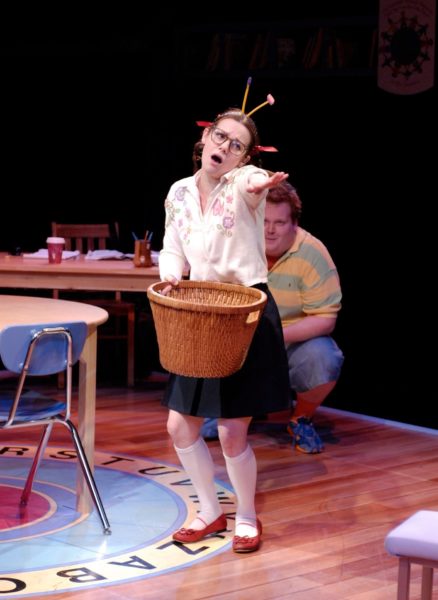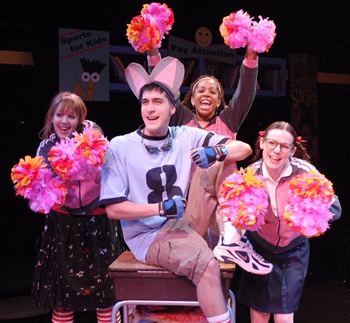UP CLOSE WITH WIZARD OF OZ STAR
FAMILY & FRIENDS MAGAZINE
She is one busy woman. It's one thing to say, "theater is your life," it's another to live, breathe and eat it 24/7 for three straight years. Playhouse on the Square resident company member, Angela Groeschen (Ingersoll), the star of Playhouse on the Square's immensely popular The Wizard Of Oz, is arguably the hardest working woman in Memphis today, and has no plans for letting up.
In an effort to talk to her about playing our community's "special friend," we had to interrupt her work on publicity for POTS's upcoming production of Picnic. That's right, when she's not onstage or in rehearsal, she spends her time doing publicity for the theater and/or teaching local Memphis children the art of acting. She and her fiance, Michael Ingersoll (another POTS resident company member) just have signed on for another year at Memphis' only professional resident theater and was more than willing to share her experience of playing that infamous girl with those ruby slippers.
F&F: It's great that you've decided to stay another year, but what made you decide to stay?
Ingersoll: It's wonderful having the security here that Michael and I have, plus we are just starting to get into voice-over work and commercials, which is helping to contribute to our financial security before we move on to Chicago or New York. Also, there are some shows on the upcoming season that are really going to "beef up" both of our resumes next year. Finally, we just really like it in Memphis. We know that we now have a home here that we can come back to anytime.
F&F: You and your fiance have played the leads in about 14 to 15 straight shows. That sounds exhausting.
Ingersoll: It's been such an educational experience and we've gotten to play such a variety of roles (most notably Bat Boy: The Musical and I Love You, You're Perfect, Now Change).
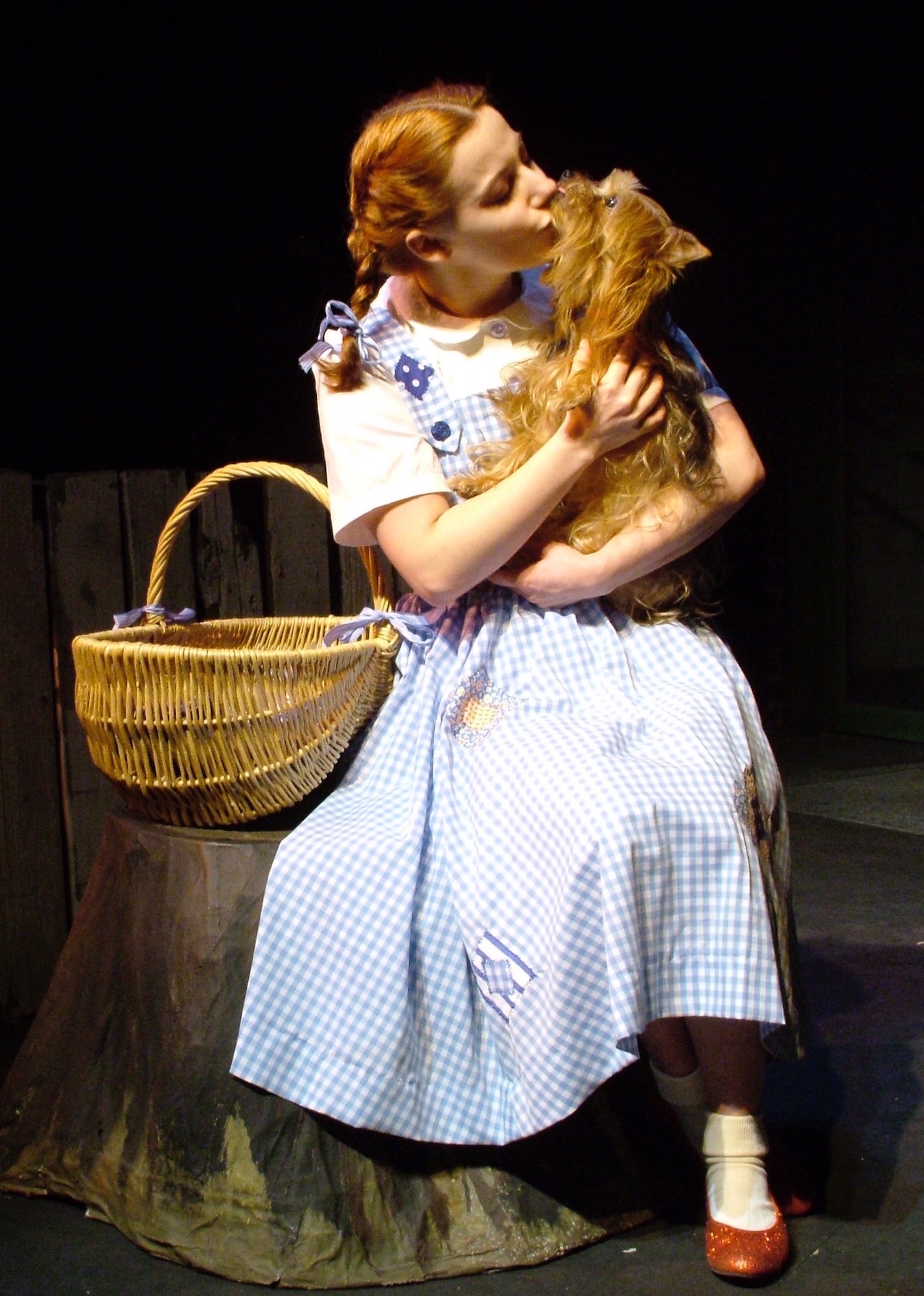
F&F: Let's talk about The Wizard Of Oz. I haven't seen it yet, so tell me, how similar is this production to the movie?
Ingersoll: No, it's not straight out of the movie. That was a big debate when we started working on this show. There is a certain desire to satisfy the audience's expectations, but you don't have to completely imitate the movie because it's already so ingrained in the head of American culture that people will fill in most of the blanks themselves. So we could depart and make some things rather unique. I know that our director, Shorey Walker (Grease and Peter Pan) updated a lot of the musical styles - "Somewhere Over the Rainbow" is now very "pop" sounding and the Winkies do this hip-hop dance a la a rock concert. It's very funny. The audience also is given green glasses to look through for when we get to Emerald City.
F&F: What's been the reaction from the audiences who love the movie so much and this version?
Ingersoll: Oh, they love it! People expecting the movie get enough of a pleasant "breath of fresh air," and enough traditional, comfortable moments. Shorey pulled from four different sources for this production (The Royal Shakespeare Company's stage version, the book, the movie, and a 1912 version of the play.) It's very interesting to watch. We'll be going along on stage in a scarecrow scene that is verbatim from the movie and then, all of a sudden, these crows enter the stage and start singing, which comes from the RSC version. We also do the "Jitterbug" number that was cut from the movie.
F&F: What kind of pressure is there on you to borrow from Judy Garland's performance?
Ingersoll: I had the same big challenge when I did The Philadelphia Story recently. The director of that production and I wanted to go down that road and definitely replicate that period, that style, that person (Katharine Hepburn), which some people loved and some people hated. It's a choice that we went with very strongly. With Dorothy, there's plenty of this character already built into my self consciousness that, although I'm certainly not aware of it happening, I'm sure aspects of Judy Garland's performance do come through to a certain extent (I've seen the movie hundreds of times). So, no, I've never made a conscious choice to imitate Judy Garland. In fact, I had to divert myself from the movie so that I could come up with my own take as much as possible.
I did a lot of study of the Jungian psychology of symbols and analysis. I had to get my head somewhere that was exciting for me and not copy the movie. The journey for myself as an actress every night doesn't feel like what I experience when I watch Judy Garland perform the same role. The feelings for her and my experiences onstage are totally different. I'm taking from the actors I'm on stage with every night, not what I expect them to be. For example, our Lion (Harry Culpepper) is not at all like Burt Lahr, in fact, he's very fey, very funny. One of the biggest challenges for me was that I wanted to make my relationships with the Scarecrow, the Tin Man and the Lion very clear and distinct from each other. I'm very "buddy buddy" with the Scarecrow (Brian James Porter); I have a big, hard-core crush on the Tin Man (Michael Ingersoll); and I mother the Lion constantly.
F&F: Without forcing you to become too philosophical, why do you think this show has had such a profound effect on the gay, lesbian, bisexual and transgender community?
Ingersoll: Well, in my research for the show, I ran across some theories as to why gay people were so attracted to Judy Garland, particularly in The Wizard of Oz. I think many in the LGBT community can identify with that child who feels no one at home understands them and must forge out into the world to find their own identity. And once they get out into the world, realizing they can't use the tools they were given growing up, must now utilize new tools as they're discovered. Even the "home" everyone is looking for is simply the realization that you must be comfortable with yourself. So, this is what I think reverberates so strongly in this community.
F&F: Well said. Thank you for taking a few minutes out of your busy theater schedule to talk to us. Now, Get back to work!
